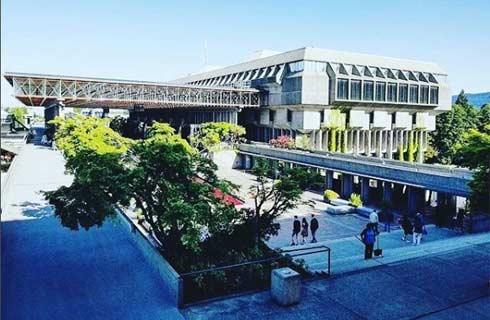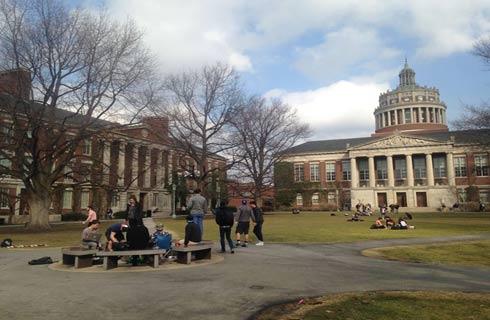- IDP China>
- 课程库>
- 工程与技术>
- 工程>
- 通用工程>
- Master of Science in Engineering and Public Policy - Infrastructure Resilience
工程与公共政策理学硕士-基础架构弹性
Master of Science in Engineering and Public Policy - Infrastructure Resilience

学历文凭
Masters Degree

专业院系
Department of Civil and Environmental Engineering

开学时间

课程时长

课程学费

国际学生入学条件
In order to be minimally qualified to pursue admission through the Graduate School of Engineering, a candidate must have successfully completed or is in the process of completing an undergraduate bachelors degree from a regionally accredited U.S. college or university, or its equivalent from a foreign college or university. Any offer of admission is contingent upon a candidate's successful completion of an undergraduate bachelors degree from a regionally accredited U.S. college or university, or its equivalent from a foreign college or university.
Transcripts. Applicants should (a) acquire official or unofficial copies of their transcripts from each college or university that they have attended (if they do not already have such copies), (b) create scanned versions of same in PDF format (up to 500 KB in size), and (c) when prompted to do so in the application, upload and attach them to the online application.
Completed online application form
$75 application fee
Two letters of recommendation
Transcripts from all institutions attended
GRE is not required for terms starting during the 2021-2022 or the 2022-2023 academic years
Statement of purpose
Resume
TOEFL, IELTS, or Duolingo for international applicants
Standardized test scores such as the GRE are not required for master's degree applicants to the School of Public Policy and Urban Affairs. However, such test scores may be helpful for applicants with little or no experience beyond undergraduate school.
TOEFL 85 / IELTS 7, GPA for Degree Progression 3.0
Transcripts. Applicants should (a) acquire official or unofficial copies of their transcripts from each college or university that they have attended (if they do not already have such copies), (b) create scanned versions of same in PDF format (up to 500 KB in size), and (c) when prompted to do so in the application, upload and attach them to the online application.
Completed online application form
$75 application fee
Two letters of recommendation
Transcripts from all institutions attended
GRE is not required for terms starting during the 2021-2022 or the 2022-2023 academic years
Statement of purpose
Resume
TOEFL, IELTS, or Duolingo for international applicants
Standardized test scores such as the GRE are not required for master's degree applicants to the School of Public Policy and Urban Affairs. However, such test scores may be helpful for applicants with little or no experience beyond undergraduate school.
TOEFL 85 / IELTS 7, GPA for Degree Progression 3.0
IDP—雅思考试联合主办方

雅思考试总分
7.0
- 雅思总分:7
- 托福网考总分:85
- 托福笔试总分:160
- 其他语言考试:NA
CRICOS代码:
申请截止日期: 请与IDP联系 以获取详细信息。
课程简介
基础设施恢复力是导致获得工程与公共政策理学硕士学位的一种集中。东北大学的工程与公共政策科学硕士(MSEPP)提供了扩展传统工程分析以与公共政策和决策相关的知识和工具。该计划通过研究某一集中的具体工程应用,结合政策分析,经济学和经济学的基本方法,涵盖了将工程设计和分析研究与影响整个社会的决策所需的经济和政策环境联系起来所需的核心技能。统计。在硕士一级,能源与环境,基础设施弹性方面的工程和公共政策集中两个方面。MSEPP学位是土木与环境工程系和公共政策与城市事务学院的联合课程。该学位是为具有工程或科学背景的学
Infrastructure Resilience is one concentration leading to a of Master of Science in Engineering and Public Policy. Northeastern's Master of Science in Engineering and Public Policy (MSEPP) provides the knowledge and tools needed to extend traditional engineering analysis to be relevant to public policy and decision-making. This program covers the core skills necessary to link engineering design and analysis research with the economic and policy contexts needed for decisions that affect society at large by studying specific engineering applications within one of the concentrations, coupled with fundamental methodologies in policy analysis, economics, and statistics. At the master's level, there are two concentrations for Engineering and Public Policy in Energy and Environment, Infrastructure Resilience. The MSEPP degree is a joint program of the Department of Civil and Environmental Engineering and the School of Public Policy and Urban Affairs. The degree is designed for students with an engineering or scientific background who wish to pursue careers relevant to public policy organizations, such as local, state, and federal public agencies, industry organizations, technology assessment and reserach firms, and engineering and management consulting groups.
Infrastructure Resilience is one concentration leading to a of Master of Science in Engineering and Public Policy. Northeastern's Master of Science in Engineering and Public Policy (MSEPP) provides the knowledge and tools needed to extend traditional engineering analysis to be relevant to public policy and decision-making. This program covers the core skills necessary to link engineering design and analysis research with the economic and policy contexts needed for decisions that affect society at large by studying specific engineering applications within one of the concentrations, coupled with fundamental methodologies in policy analysis, economics, and statistics. At the master's level, there are two concentrations for Engineering and Public Policy in Energy and Environment, Infrastructure Resilience. The MSEPP degree is a joint program of the Department of Civil and Environmental Engineering and the School of Public Policy and Urban Affairs. The degree is designed for students with an engineering or scientific background who wish to pursue careers relevant to public policy organizations, such as local, state, and federal public agencies, industry organizations, technology assessment and reserach firms, and engineering and management consulting groups.
相关申请
 预科
预科 奖学金
奖学金 实习机会
实习机会 在校学习
在校学习 跨境学习
跨境学习 校园授课-线上开始
校园授课-线上开始 在线/远程学习
在线/远程学习
学校排名

世界排名184
数据源:
泰晤士高等教育世界大学排名
本校相关课程

生物工程理学硕士
学历文凭
Masters Degree
开学日期
课程费用总额


生物技术理学硕士
学历文凭
Masters Degree
开学日期
课程费用总额


工商管理硕士
学历文凭
Masters Degree
开学日期
课程费用总额


生物工程理学硕士
学历文凭
Masters Degree
开学日期
课程费用总额


生物工程理学硕士-生物医学设备和仪器
学历文凭
Masters Degree
开学日期
课程费用总额


生物工程理学硕士-生物材料
学历文凭
Masters Degree
开学日期
课程费用总额

其他相关课程

管理工程应用科学学士学位
 滑铁卢大学
滑铁卢大学学历文凭
Bachelor Degree
开学日期
课程费用总额


工学学士
 劳伦森大学
劳伦森大学学历文凭
Bachelor Degree
开学日期
课程费用总额


安大略大学电子工程技术员文凭
 圣力嘉学院
圣力嘉学院学历文凭
Bachelor Degree
开学日期
课程费用总额


大学转学计划-工程
 哥伦比亚学院
哥伦比亚学院 学历文凭
Foundation for Undergraduate
开学日期
课程费用总额


生物系统工程哲学博士
 曼尼托巴大学
曼尼托巴大学学历文凭
Ph.D.
开学日期
课程费用总额


生物系统工程学硕士
 曼尼托巴大学
曼尼托巴大学学历文凭
Masters Degree
开学日期
课程费用总额










 美国
美国
